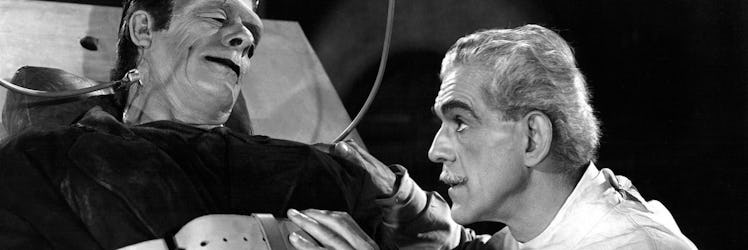Why ‘Frankenstein’ Is The Best Parenting Book You Haven’t Read
So ... what does that make 'Young Frankenstein'?

The following was syndicated from Brightly for The Fatherly Forum, a community of parents and influencers with insights about work, family, and life. If you’d like to join the Forum, drop us a line at TheForum@Fatherly.com.
Books always make the best baby shower gifts. So, whenever I go to a shower, I usually try to bring the baby a cute board book and I usually bring the parents, what I regard, as the single best book about parenting that I’ve ever read.
It’s not What To Expect When You’re Expecting. Or The Battle Hymn Of The Tiger Mother. Or whatever it was that Dr. Spock wrote.
The book I bring parents is Mary Shelley’s Frankenstein.
Seriously.
Yes, Frankenstein is gothic, weird, and metaphysical, but, at its heart, it’s the story of a parent and a child.
(Is the child an eerie patchwork corpse-man? Sure, but that’s not his fault. Your kid might have braces, cowlicks, and huge nostrils, but that’s not their fault, is it? Let’s not judge.)
Frankenstein is all about the age-old question of nature vs. nurture, specifically, what happens to a child’s nature when their parent neglects to nurture it.
Victor Frankenstein discovers how to create life while at college (so did I, but I didn’t go nuts with it) and decides to give it a shot. He ends up being more cavalier about giving birth than even the all-time worst cast members of MTV’s Teen Mom.
However, once Victor lays eyes on his newborn “son” for the first time, he completely freaks out.
“Oh! No mortal could support the horror of that countenance…”
(Not cool. Here’s the thing — Parents, we’ve all been there. The kid comes out. They’re all smooshed and red and angry. They always don’t look like baby dolls.)
Victor can’t deal with the realness of his less-than-perfect creation, so he takes off, leaving his poor, lonely Creature to experience the world on his own. Victor is a bad, bad daddy.
Over the years, I’ve come to realize that my number one job as a parent is to provide my child with context. I chose to help bring my daughter into this world — a strange, harsh, often-confusing reality. My daughter didn’t have any input on that decision. So, because I (and my wife) made that choice without my daughter’s consent, we saw it as our responsibility to help introduce her to the world, to try to translate the insanity into something she could understand, rationally and emotionally.
And that is the number one way that Victor Frankenstein fails his creation. Victor refuses again and again to take responsibility for his role as a father and he lets his “son” learn about the world from a distance. Which doesn’t work out well for Victor. Let’s just say if you thought it was hard to connect with an emotionally-confused teenager going through puberty, imagine what it would’ve been like if that kid was a hulking, 8-foot-tall cadaver-man with a penchant for snapping necks.
This is why I love giving Mary Shelley’s Frankenstein to parents — it’s the ultimate caregiver cautionary tale. If you make the decision to bring life into the world (or nurture a life that already exists), take your role as that decision-maker seriously… or else.
So, the next time you’re headed to a baby shower, maybe grab a copy of Frankenstein and let your friends know that sometimes being a parent starts with resisting the urge to run away from your horrific little monster at first sight and builds from there.
Or you could give them their fifth copy of Goodnight Moon. Up to you.
Tom Burns is the founder of BuildingaLibrary.com, a website devoted to helping parents find the right books for their kids, and has served as a contributing editor for 8BitDad.com and The Good Men Project. He has contributed as a writer for Brightly.
This article was originally published on